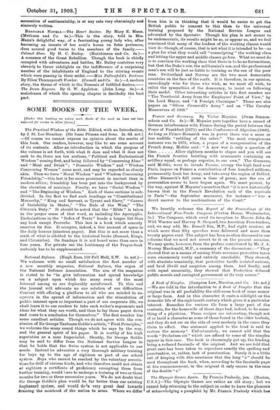new monthly magazine, National Defence, the organ of the National
Defence Association. The aim of the magazine is stated to be "to give information and spread knowledge on a subject upon which too many oven of the most leisured among us are deplorably uninformed. To this end the journal will advocate no one solution of our difficulties. Content with offering a platform to all who are minded to co- operate in the spread of information and the stimulation of public interest upon so important a part of our corporate life, we shall leave it to our readers to take each writer's arguments and ideas for what they are worth, and then to lay these pages down and come to a conclusion for themselves." The first number has some excellent articles. Though we do not agree with the con- clusion of Sir George Taubman Goldie's article, "First Principles," we welcome the many sound things which he says by the way, and the general spirit of his paper. It is worthy of his high reputation as a sane Imperialist. Shortly, Sir George Goldie may be said to differ from the National Service League in that he holds that the Swiss system is not applicable to our needs. Instead he advocates a very thorough military training for boys up to the ago of eighteen as part of our school system. Boys who cannot be reached by the voluntary associa- tions for drill of various kinds, and who therefore could not obtain at eighteen a certificate of proficiency exempting them from further training, would have to undergo a training of two or three months for two or three successive years. We do not doubt that Sir George Goldie's plan would be far better than our existing haphazard system, and would do is very great deal towards training the manhood of the nation to arms. Where we differ from him is in thinking that it would be easier to get the British public to consent to this than to the universal training proposed by the National Service League and advocated by the Spectator. Though his plan is not meant to be undemocratic, its results might be so, or appear so, and we feel convinced that many of the leaders of the working classes would view it—though, of course, that is not what it is intended to be—as a plan for what they would call " conscripting " the working class and letting the upper and middle classes go free. What we must do is to convince the working class that there is to be no favouritism, but that the Duke's son, the millionaire's son, and the professional man's son will be just as liable to training as the son of the poor man. Switzerland and Norway are the two most democratic countries on the face of the earth. It is therefore, in our opinion, exceedingly wise for those who wish, as we must all wish, to enlist the sympathies of the democracy, to iusist on following their model. Other interesting articles in this first number are "The Territorial Army from the Employers' Point of View," by the Lord Mayor, and "A Foreign Chronique." There are also papers on "Oliver Cromwell's Army" and on "The Cavalry Manoeuvres of 1908."














































 Previous page
Previous page